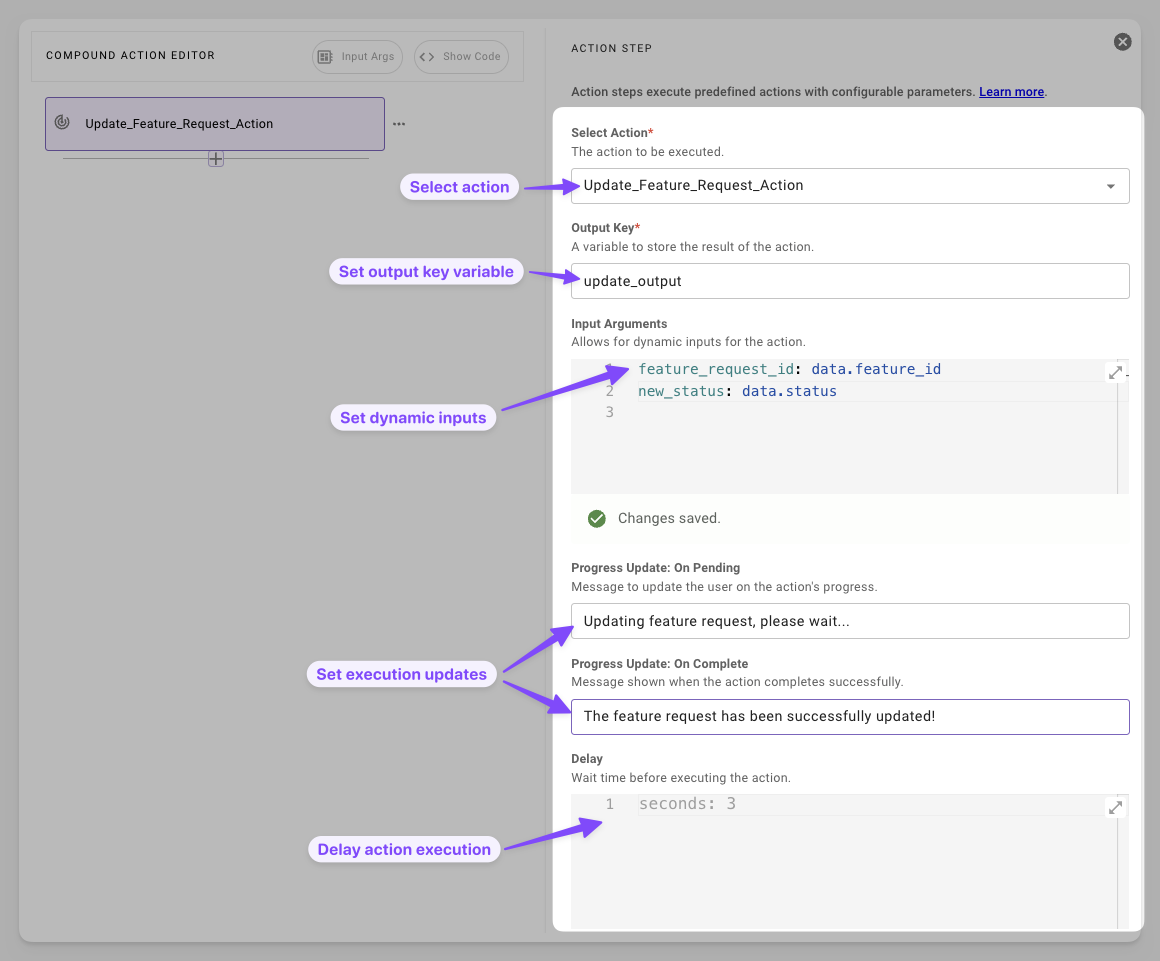Action
Overview
Actions are the core executable units in compound actions, think of them as your agent's "doers". Use this expression to invoke predefined actions.
Key concepts
- Action Types: Supports three types callable via
action_name: HTTP actions (for API calls), script actions (for custom logic), and Compound Actions (for reusable workflows). - Execution Flow: The expression runs the specified action, storing results in an output key variable for downstream use. Delays handle asynchronous behaviors pausing the execution of the flow.
- Dynamic Elements: Pass variables from prior steps or user data using Moveworks Data Mapping; outputs capture full API responses or script results.
Low-Code Editor
Add an action step to the editor, then use the right-hand panel to wire it up. Below, follow the annotated steps to build a simple feature request update (e.g., via an HTTP action). Follow the steps to build a simple action expression.

- Select Action: Choose from your predefined actions. Tip: If it's a new action, define it first.
- Set Output Key Variable: Name a variable to capture the result. This stores the API response or script output for later steps. Tip: Use descriptive names like
update_outputto avoid debugging headaches. - Set Dynamic Inputs Map inputs via code editor fields such as
feature_request_id: data.feature_id. Common Pitfall: Ensure vars exist upstream. - Set Execution Updates Customize user-facing messages for pending ("Updating feature request, please wait...") and complete ("The feature request has been successfully updated!") states.
- Delay Action Execution Add a wait (e.g., 3 seconds) via units like seconds or minutes.
Syntax Reference
Schema
action:
action_name: ACTION_NAME* # str: HTTP/script/compound action ID (e.g., 'fetch_user_details')
output_key: OUTPUT_VAR* # any: Variable to store results (e.g., 'user_details')
input_args: # dict: Dynamic params (uses Data Mapping Syntax)
key1: VALUE_EXPR # e.g., data.user_id or static '''abc123'''
key2: VALUE_EXPR
progress_updates: # dict: User messages (optional)
on_pending: 'PENDING_MSG' # e.g., "Fetching details..."
on_complete: 'COMPLETE_MSG' # e.g., "Success!"
delay_config: # dict: Wait time (optional; DSL number expr per unit)
seconds: 'DSL_EXPR' # e.g., "10" or "data.delay"
# Other units: minutes, hours, daysFields
| Field | Type | Mandatory | Description |
|---|---|---|---|
action_name | string (action identifier) | Yes | Specifies the HTTP, script, or Compound Action to run. |
output_key | string | Yes | Name of variable storing the action's result (e.g., API response). |
input_args | dictionary | No | Key-value pairs for action parameters |
progress_updates | dictionary {on_pending: string, on_complete: string} | No | Messages shown to user during pending and completion states. |
delay_config | dictionary of DSL number expressions | No | Time units (seconds, minutes, hours, days) for pre-execution wait. |
Practical Examples
Example 1: Basic HTTP Action
Retrieve user info via API, with progress feedback
action:
action_name: fetch_user_details # HTTP action
output_key: user_details
input_args:
user_id: data.user_id # Dynamic from input args
delay_config:
seconds: "5" # Brief pause before executing
progress_updates:
on_pending: "Looking up your profile..."
on_complete: "Profile loaded!"Expected Output
data: {
user_details: {
"user_id": "abc123",
"name": "Jane Smith",
"email": "[email protected]"
}
}The API response is stored un the user_details output key defined above and is now available in the data bank for any downstream steps.
Example 2: Script Action
Run a script action that add two strings together
Python script
return str1 + " " + str2Action
action:
action_name: add_two_strings # Script action
output_key: concatenated_strings
input_args:
str1: meta_info.user.name
str2: '''is an AI Engineer'''
Example 3: Nested Compound Action
Run a compound action that approves and notifies a ticket
Nested Compound Action
# approve_and_notify
steps:
- action:
action_name: approve_ticket
output_key: approved_ticket_output
input_args:
ticket_id: data.ticket_id
status: '''approved'''
- action:
action_name: notify_team
output_key: notified_team_output
input_args:
team_id: data.approved_ticket_output.team_id
Action calling nested compound action
action:
action_name: approve_and_notify # Compound action
output_key: ticket_status
input_args:
ticket_id: data.ticket_id
progress_updates:
on_complete: "Ticket approved and team notified!"Updated 5 months ago